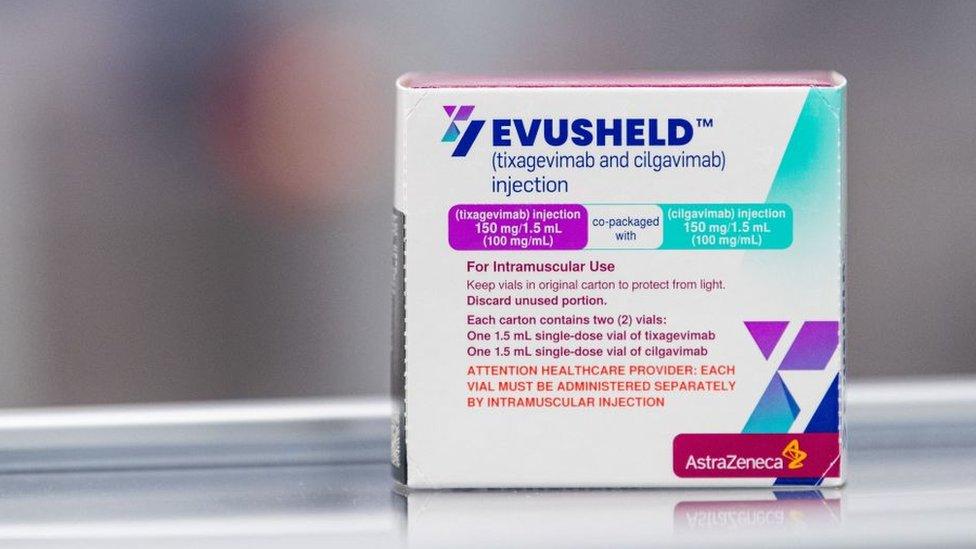Covid: Evusheld antibody protection ruled out for most vulnerable
- Published

The antibody treatment boosts protection against Covid for those whose immune systems do not respond well to vaccines
A Covid protection for people with weakened immune systems has been shelved in the UK because of a lack of evidence over how well it works against the Omicron variant.
The Department of Health said it would not be buying doses of the Evusheld injection.
Charities and patient groups said they were disappointed by the decision.
Blood Cancer UK said many immunocompromised people would have to continue isolating.
It called on the government to review its decision so that they could be protected over the winter months.
Evusheld, developed by AstraZeneca, contains two antibodies against Covid that boost protection for those whose immune systems do not respond well to vaccines.
They include people with blood cancer, and organ transplant patients.
The antibodies bind to the spike protein on the outside of the coronavirus, which causes Covid-19, preventing it from attaching to and entering human cells.
But despite clinical trials in adults showing a 77% reduction in the risk of developing Covid symptoms for at least six months after a single dose, the government wants evidence of longer protection against the variant circulating now.
There is a stark contrast between the lightning speed in which Covid vaccines were fast-tracked for use after clinical trials and the response to Evusheld.
It was approved by the UK regulator, the MHRA, in March.
Now, five months on, the Department of Health has rejected its use for the foreseeable future.
The sticking point seems to be that the trials of Evusheld - some of which were carried out in the UK - reported before the arrival of Omicron, so it's unclear how long the protection will be against this now dominant Covid variant.
But AstraZeneca says there is ample real-world data that Evusheld works.
It points to data from Israel that immunocompromised patients given Euvsheld were 92% less likely to die or be hospitalised due to Covid than those untreated.
It has doubled the dosage recommendation in response to Omicron.
AstraZeneca, whose headquarters are in Cambridge, is selling Evusheld in 32 countries including the US, Canada and parts of the EU.
A review by the health watchdog NICE will get under way this autumn, but is not expected to report until April next year.
Blood Cancer UK said many of its community would be "left feeling let down and vulnerable" by the decision.
"We're urging the government to meet with us and outline their rationale for this decision," said Helen Rowntree, director of research, services and engagement.
"For months now Evusheld has been used in countries including the US and Israel and there is a significant body of evidence showing that this drug can reduce the chance of dying from Covid in those who are most vulnerable.
"The decision today will mean that many people who are immunocompromised will be left with no other option than to isolate themselves from their loved ones."